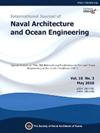Experimental study on ultimate bearing capacity of pre-cracked ship hull stiffened panel under low-cycle fatigue and accumulative plasticity coupling
IF 3.9
3区 工程技术
Q2 ENGINEERING, MARINE
International Journal of Naval Architecture and Ocean Engineering
Pub Date : 2025-01-01
DOI:10.1016/j.ijnaoe.2025.100688
引用次数: 0
Abstract
Ships navigating in complex sea conditions typically do not experience catastrophic failure due to a single extreme load; rather, the primary structural components such as stiffened panels of the hull undergo plastic deformation under repeated cyclic loading and may develop cracks under low-cycle fatigue. This leads to a decrease in ultimate bearing capacity and eventual structural failure due to insufficient ultimate strength, resulting in hull buckling. Currently, methods for evaluating the ultimate strength of ship hull stiffened panels under cyclic extreme loading considering the coupling effects of accumulative plasticity and low-cycle fatigue are not well-developed. Therefore, there is a need for research into computational methods for assessing the ultimate strength of stiffened panels structures considering the coupling effects of these two factors. This paper investigates the ultimate load-bearing capacity of pre-cracked stiffened panels under the combined effects of accumulative plasticity and low-cycle fatigue. During the experiments, hysteresis curves of stress-strain relationships and relevant fracture parameters for stiffened panels were obtained under various crack positions and load conditions. Ultimately, the study provides the ultimate load-bearing capacity of stiffened panels considering low-cycle fatigue and accumulative plasticity interactions, offering a foundational calculation basis for designing vessels under severe sea conditions.
低周疲劳-累积塑性耦合作用下预裂船体加筋板极限承载力试验研究
在复杂海况下航行的船舶通常不会因单一极端载荷而发生灾难性故障;相反,船体加筋板等主要结构部件在反复循环载荷下发生塑性变形,并可能在低周疲劳下产生裂纹。这将导致极限承载能力下降,最终由于极限强度不足而导致结构破坏,从而导致船体屈曲。目前,考虑累积塑性和低周疲劳耦合效应的船体加筋板极限强度评估方法尚不成熟。因此,有必要研究考虑这两个因素耦合作用的加筋板结构极限强度计算方法。研究了累积塑性和低周疲劳共同作用下预裂加筋板的极限承载能力。实验中,得到了加筋板在不同裂纹位置和荷载条件下的应力-应变关系的滞回曲线及相关断裂参数。最终得到考虑低周疲劳和累积塑性相互作用的加筋板的极限承载能力,为恶劣海况下船舶设计提供基础计算依据。
本文章由计算机程序翻译,如有差异,请以英文原文为准。
求助全文
约1分钟内获得全文
求助全文
来源期刊

International Journal of Naval Architecture and Ocean Engineering
ENGINEERING, MARINE-
CiteScore
4.90
自引率
4.50%
发文量
62
审稿时长
12 months
期刊介绍:
International Journal of Naval Architecture and Ocean Engineering provides a forum for engineers and scientists from a wide range of disciplines to present and discuss various phenomena in the utilization and preservation of ocean environment. Without being limited by the traditional categorization, it is encouraged to present advanced technology development and scientific research, as long as they are aimed for more and better human engagement with ocean environment. Topics include, but not limited to: marine hydrodynamics; structural mechanics; marine propulsion system; design methodology & practice; production technology; system dynamics & control; marine equipment technology; materials science; underwater acoustics; ocean remote sensing; and information technology related to ship and marine systems; ocean energy systems; marine environmental engineering; maritime safety engineering; polar & arctic engineering; coastal & port engineering; subsea engineering; and specialized watercraft engineering.
 求助内容:
求助内容: 应助结果提醒方式:
应助结果提醒方式:


